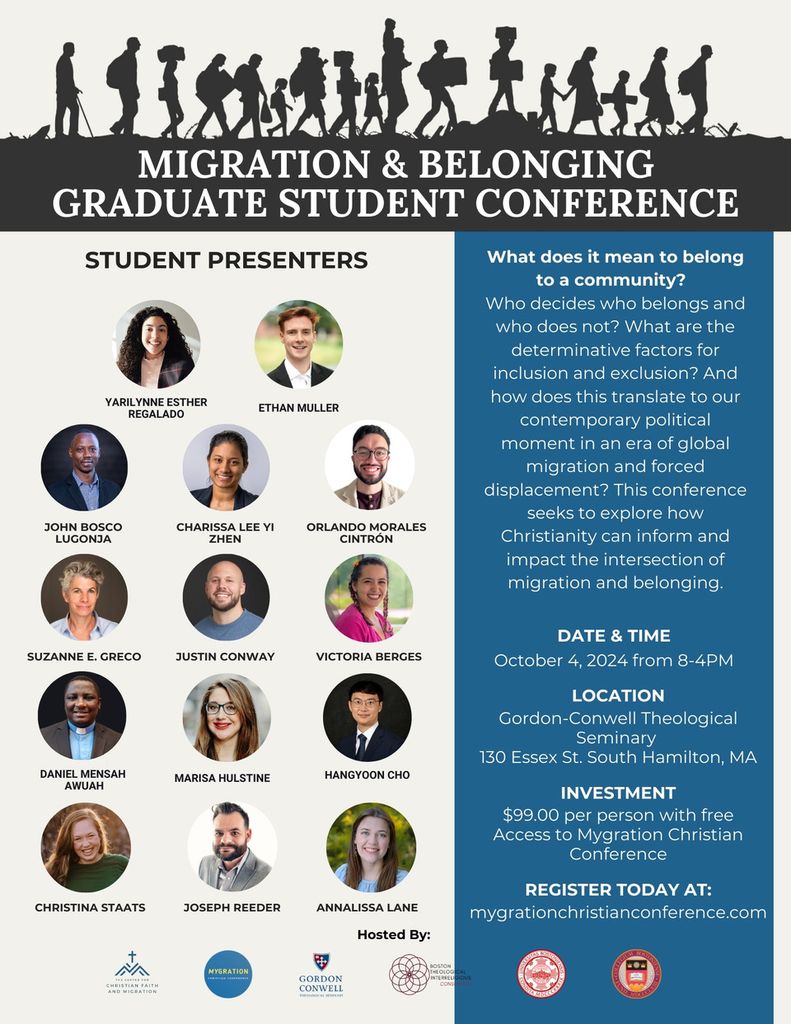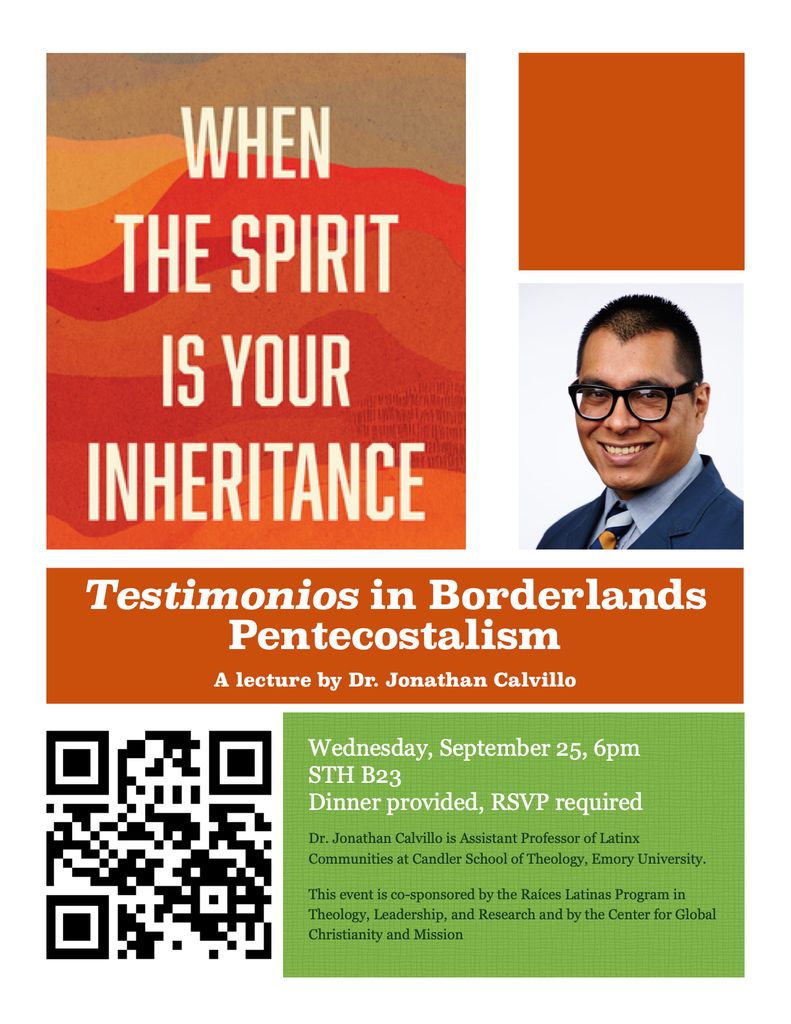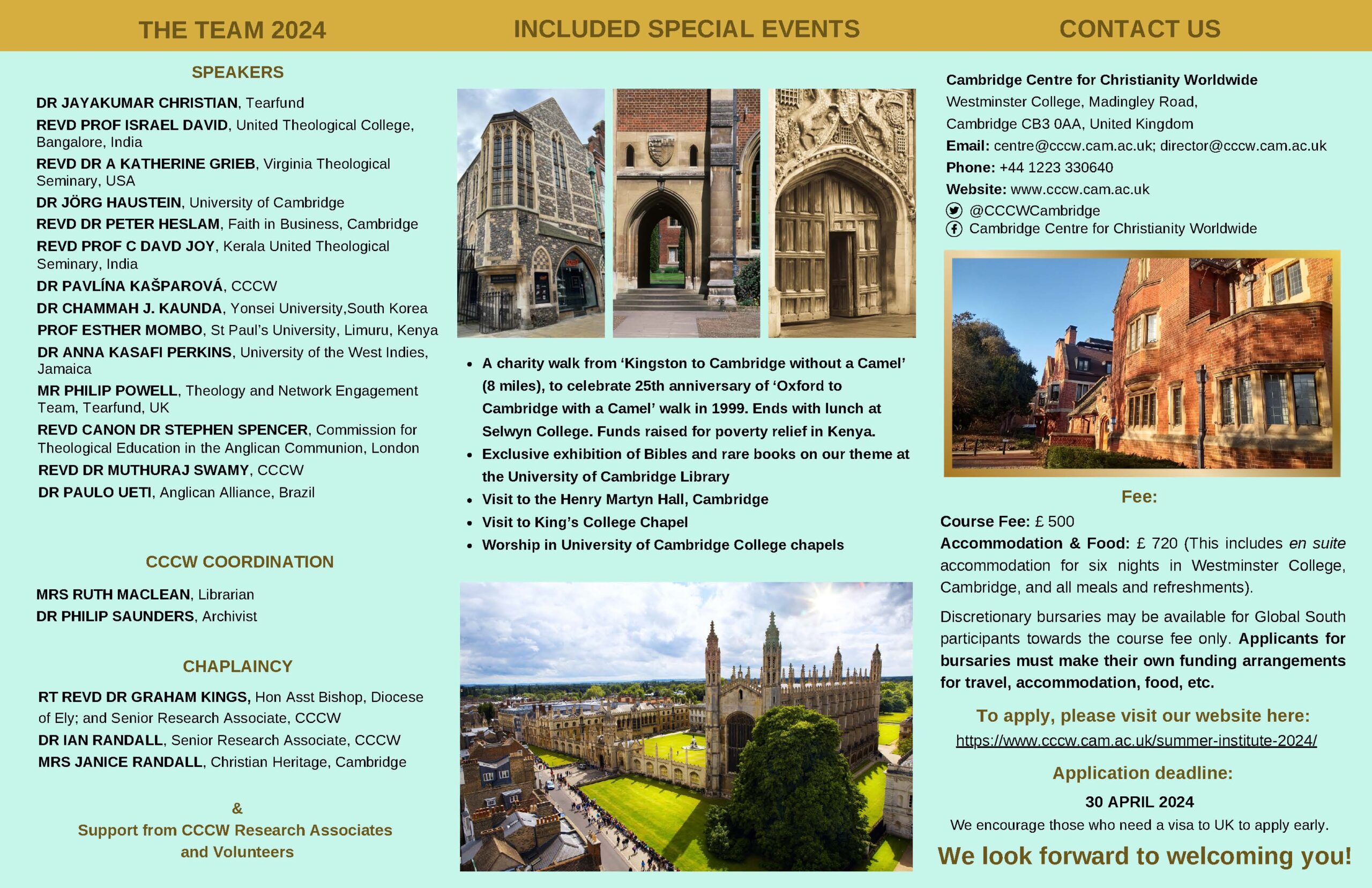Migration and Mygration Conferences
Gordon Conwell Theological Seminary will host two events on migration on October 4 - 5. On the 4th, there will be the graduate student conference on "Migration and Belonging," and on the 5th, there will be the church-centered event "Mygration." Justo Gonzalez will be the keynote speaker.

Pentecostalism, Latinx Community and Hip-Hop
Dr. Jonathan Calvillo will give a lecture, "When the Spirit is your Inheritance: Testimonios in Borderlands Pentecostalism."

Remembering Inus Daneel
I met Inus Daneel in 1998 when I took his class on African Traditional Religion at Boston University. I had just spent two years living in West Africa and was trying to make sense of the significance of that experience for my own future. We quickly connected over our love of Africa and by the time I finished my second class with him on African Christianity we had forged a close bond, fortified by his wonderfully hospitable presence and by long talks in his office in the African Studies Center.
In class and out, I came to see him as more than a professor seeking to help us students understand and grow professionally. He made himself available as a companion and guide through the landscapes of the spirit we walked, ever ready to help us meet the different challenges we faced in life.
I thought for a time I too might become an Africa scholar and even spent ten days in Masvingo exploring some research possibilities with him. But I eventually sensed my path lay in a different direction. Yet he remained a good friend and mentor after that and always an inspiration for the depth of his Christian witness, for his adventurous, observant, and joyful spirit, and for his lifelong closeness to the Shona people of Zimbabwe, including at great personal sacrifice during the civil war there in the 1970s.
I treasured meals with him in the BU student union and was honored by his presence at important moments during my remaining graduate school years in Boston—at my doctoral exams during which he argued for my passing with distinction, after my dissertation defense when he offered a congratulatory toast before family and friends, and in sending me significant and unanticipated counsel after my wife Susanna and I decided to marry.
Somewhere along the way I realized that he had become a father figure to me—that he fit that role in my life—and when I last saw him in 2023 he said something close to that, saying that he thought of me as a younger brother. However best to describe the connection, after twenty-five years it was something we both recognized, though with him as the elder I know I am far more indebted.
Amid the different encounters we had over the years, he taught me some very important things: courage in time of trial, fighting for a worthy cause, standing on principle, humility before the divine mystery, attentiveness to the Spirit’s presence, and perhaps most of all, trust in God’s providence. Life to him, I know, was a sacred sojourn, miraculous and intensely interesting. It is obviously marred by terrible tragedy and evil, but because it is ultimately supported by God’s love and goodness, we can have faith in creation and in each other, walk across walls and barricades, and look out for the new things that God is doing this day.
Since Inus passed, I have been remembering many of the stories he told me—of growing up at Morgenster Mission, of his theological training in South Africa and in the Netherlands, of living among the Shona and enduring the war, and of promoting ecumenism, theological education, and earthcare. These stories were always captivating, yet they were also sometimes sad because he endured some difficult years and often lived close to those with heavy burdens to bear.
I have also been remembering other scenes—of praying with him before meals, watching him befriend Shona strangers by comparing ancestral lineages, him writing out for me an English translation of a Dutch Reform Church service in Afrikaans, hearing him address a village congregation on reconciliation within a ring of stones under a tree, and most recently, marathon talks with him at his and Dana’s home in Somerville.
Reflecting on all this, I cannot measure the gift of having walked these paths with him since that first class day in 1998 or of having witnessed the testament to God’s love, abundant creativity, and surpassing faithfulness that was his life. Farewell, Inus! May the Lord meet you on your way and bring you home!
By William (Bill) Gregory
HDS Yang Visiting Scholars in World Christianity Now Accepting Applications for 2025-26
WORLD CHRISTIANITY SUMMER INSTITUTE
CCCW runs an annual residential Summer Institute on ‘World Christianity and Global Challenges’ in Cambridge. It is a wonderful opportunity for Christians to gather together to learn about Christianity in other parts of the world. It is also an opportunity to build relationships as global Christians.
To apply, visit: https://www.cccw.cam.ac.uk/summer-institute-2024/

BC Ricci Institute and Harvard-Yenching Institute joint fellows presentations

CCCW World Christianity Seminar by Christian Anderson
Announcing an upcoming seminar organized by Cambridge Center for Christianity Worldwide.
Topic: CCCW World Christianity Seminar by Christian Anderson
Time: 16.00hrs GMT on Tuesday, 20 February 2024
In-person: Room 7 at the Divinity Faculty
Alternatively, join Zoom Meeting
https://theofed-cam-ac-uk.zoom.us/j/93136508607?pwd=QnRRcG55TkNndVJZbFcvUGZPMEdHdz09
Meeting ID: 931 3650 8607
Passcode: 568920

Yale-Edinburgh 2024: Call for papers
Yale-Edinburgh 2024
Call for papers
The Yale-Edinburgh 2024 conference will be hosted by the Yale Divinity School, New Haven, CT, 26th-28th June, 2024.
The theme is Spirit and the Spiritual: Ancestors, Deities and the Holy Spirit in Church, and Mission. Missions from the West brought Christianity into worlds with a wide array of cosmologies. Recipient cultures embraced the Christian faith while negotiating differing perspectives of spiritual realities. The subsequent transition from missionary Christianity to indigenous faith produced a range of responses to the notion of ‘spiritual beings.’ Through mission, Christianity encountered traditional religions that venerated ancestors, revered spiritual beings, and navigated intricate relationships between deities in a world far more complex than the typical Western experience. From Korea to Brazil, Nigeria to Samoa, France to India - these multifaceted cosmologies continue to animate the Christian experience producing dynamic expressions of the faith. Movements of the Holy Spirit represent another dimension of Christianity. A wide range of pneumatic Christianities populate the long history of Christian expansion around the world.
World Christianity scholarship is deeply enriched through exploration of the historical, theological, and missiological implications of these relationships between the Holy Spirit and the Spiritual worlds of Christians across the globe. The Yale Edinburgh Conference 2024 especially welcomes contributions that illuminate the interactions between the spiritual realities of recipient cultures and missionary notions of the Holy Spirit; provide historical accounts of religious transformations with respect to ancestors, deities, and other spiritual beings in the process of Christian expansion; enlarge current understandings of local and diasporic perspectives of spiritual beings and their role in Christian expressions; provide comparative studies of missionary approaches to spirits and deities across denominations and across time; venture into ecumenical and interfaith dynamics with respect to spirits and the spiritual; or map trajectories of discourses on the Holy Spirit and other beings in a rapidly changing world.
Please supply an abstract of 250 words to world.christianity@yale.edu (link sends e-mail) by 15th February 2024. Your abstract should clearly state, among other things, the enquiry, method, and historical context in which you situate your paper.
The gathering at New Haven will be in person. There will be a conference hub in Nairobi and in Singapore on the same theme and on the same dates.
For more information see link
International Conference, Berlin, 19–21 September 2024
Christian Internationalism in war and post-war times, c. 1890–1930
International Conference, Berlin, 19–21 September 2024
Conveners: Prof. Dr. Judith Becker, Berlin, and PD Dr. Felicity Jensz, Münster
The late nineteenth century was a time of heightened nationalism. Somewhat paradoxically, it was also the period in which Christian internationalism and interdenominationalism – the young ecumenical movement (Becker/Robert 2024) – emerged. The ecumenical movement at the end of the 19th and beginning of the 20th centuries was ‘young’ in two respects: one, it was the beginning, the formation phase of the movement, and two, agents were mostly young people, or at least people who worked in young people's associations, such as the YMCA, the SCMs, SVMs etc. Through their work, they tried to overcome both national and denominational boundaries. Some groups advocated for peace, most prominently the World Alliance for International Friendship Through the Churches. Yet, peace was not their predominant goal. Their main goal was to build a worldwide Christian community that was based on fellowship and friendship. They felt called by God to work for this universal community. Of course, this approach had many downsides, not least that this global Christian community was, in reality and often unconsciously, a Protestant Christian community, and, furthermore, an Anglophone or Anglophone dominated Protestant Christian community. Moreover, the organisations and associations stemming from the young ecumenical movement were predominantly white and male dominated organisations based in Europe or the USA. Many young ecumenicals strove for community and justice and became increasingly influential in both Church leadership positions and, even more interestingly, in their respective national politics.
Given the historical tensions between Christian internationalism and national politics we are interested in exploring how these ‘young’ ecumenicals reacted to the wars that were fought by their countries? How did this influence their conceptions and their practices, both religious and political/social?
These research questions are timely given that the current global political situation is threatened by many different wars and that we can gain insights to current conflicts through historical examples. In recent academic debates, the role of religion in war and post-war times has regained central importance, particularly in Western countries. After decades of research on religion and peace – and especially Christianity and peace – public and academic attention has (re)turned to war and violence. While it is evident that war and physical violence cannot be separated from other forms of violence, at this conference we are primarily concentrating on wars and physical violence. For some scholars, such as Assmann, religion (and monotheist religion in particular) furthers, enables, or even causes war. This is in opposition to how many religious groups would perceive themselves.
The argument that links monotheist religion to violence often points to the exclusivist claim of all monotheist religions. With regard to early modern and modern times, this is often connected with nationalism, especially with reference to Western countries that, for centuries, privileged one (Christian) denomination, often to the detriment of other denominations and religions that were not privileged or at times even prohibited. One faith – the ‘right’ faith – and one religious practice were sometimes even inextricably tied to one nation, as in the cases of State Churches as in England or Sweden. Thus, says the argument, nationalism and certain forms of Christianity reinforced each other.
We aim to bring together scholars from different disciplines and academic backgrounds at a conference that will take place in Berlin in September 2024, which will examine the relationship between wars and Christian internationalism in the late 19th/early 20th centuries. It will explicitly not only focus on World War One but also invites papers on other wars, wars between non-Western countries such as the Russo-Japanese War or colonial wars. In this way, we intend to open the topic for non-Western perspectives and enlarge our understanding of this topic. The conference will work with an open definition of ‘war’ with a focus on physical violence and combat.
The leading questions are:
How did agents of the ecumenical movement at the turn of the century react to the wars that were fought by their countries? How did this influence their conceptions and their practices, both religious and political/social?
Further questions are (please address at least two of these):
- In your case study, how did the war or post-war experience change attitudes towards, definitions or practices of internationalism?
- How did the actors try to use the war/post-war experience for their internationalist (or nationalist) agenda?
- How did they react to the war/post-war (in theology, religiosity, ideology, and practice) and how did their Christian internationalist beliefs shape this?
- What is the definition of ‘war’ in your case? (Mainly applicable when not talking about WWI)
- What was the link between nationalism and internationalism in relation to the respective wars?
- How did the actors use their ecumenical networks to oppose wars?
- Did the ‘international’ aspect of the ecumenical movement hold up in the face of war and its aftermath?
- How did religious actors (re)interpret their networks and their religiosity in light of war?
- What was the role of women and of non-Europeans in the shaping of ecumenical responses to war?
Organisational information:
Date: 19–21 September 2024
Venue: Humboldt Universität zu Berlin, Faculty of Theology
Travel and accommodation costs are covered by the Humboldt University.
We invite proposals from all historical disciplines and all backgrounds. Please send us a title and a short abstract (300 words) by 15 February 2024. Please send also a one-page CV.
Please send your proposals to Franziska Schulze <franziska.schulze.1@hu-berlin.de>.
Further proceedings:
About a month before the conference, we will ask you to submit an abstract of 2-3 pages to be distributed to the other participants before the conference.
The publication of a conference volume is envisaged.
CGCM Notes: September 2023
As the fall begins in New England, students, faculty, and researchers gather in Boston. The new academic year always brings hope and excitement as people come from around the world, ready and eager to explore new ideas among a supportive community of fellow seekers and learners.
The new academic year provides a welcome restart, as the past few months have been difficult for many of us. Individuals connected with the CGCM have experienced the effects of anti-Christian violence, and the tragic consequences of climate change in Maui and Vermont. Several have suffered from covid, with significant after-effects. Some are living in places where research into Christianity is opposed by hostile governments. At the same time, much good is being done. In the past six months, folks connected with the Center have taught in Africa, led mission trips overseas, published books and articles, secured important new positions, and lectured in a range of venues from the Midwest to Korea. In June, a substantial group of alums gathered at the American Society of Missiology annual meeting in South Bend, Indiana. It is an amazing validation of our program that the incoming President and Vice-President–as well as the designated authors of the updated history of the ASM–all studied at Boston University.
As we resume CGCM Notes and CGCM News, we will be sharing some of the highlights of the amazing work going on in Boston and beyond. One new addition to our website will be a CGCM Publications page. Individual researchers do their own research and writing. But we also have a growing list of publications that reflect substantial support by the CGCM as well as authorship by multiple people associated with the Center. The Publications page will include links for acquiring our publications, ranging from the free downloads of the quarterly Journal of African Christian Biography, to scanned earlier works, to recent books available for purchase. Two new books are worth mentioning. First is the prize-winning publication Visions of Salvation: Chinese Christian Posters in an Age of Revolution (Baylor University Press, 2023) edited by Prof. Daryl R. Ireland. This book showcases the China Posters Project of the CGCM, as well as includes articles by scholars associated the project. The second publication, Creative Collaborations: Case Studies of North American Missional Practices, was a product of the North American mission study coordinated by the Center for the Commission on World Mission and Evangelism of the World Council of Churches. Not only did three faculty and students edit the volume, but half a dozen mission scholars connected with the School of Theology contributed articles. As we reconvene this fall, we look forward to sharing other news and insights into both our individual and our collaborative work.
Dana L. Robert